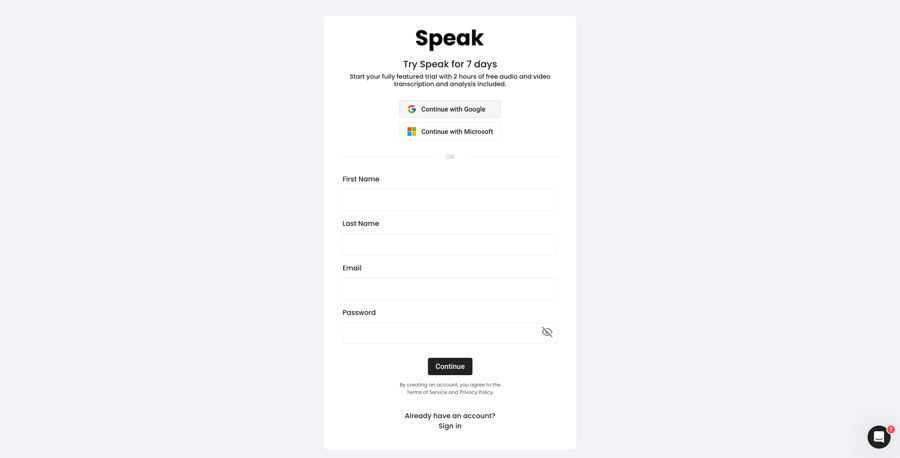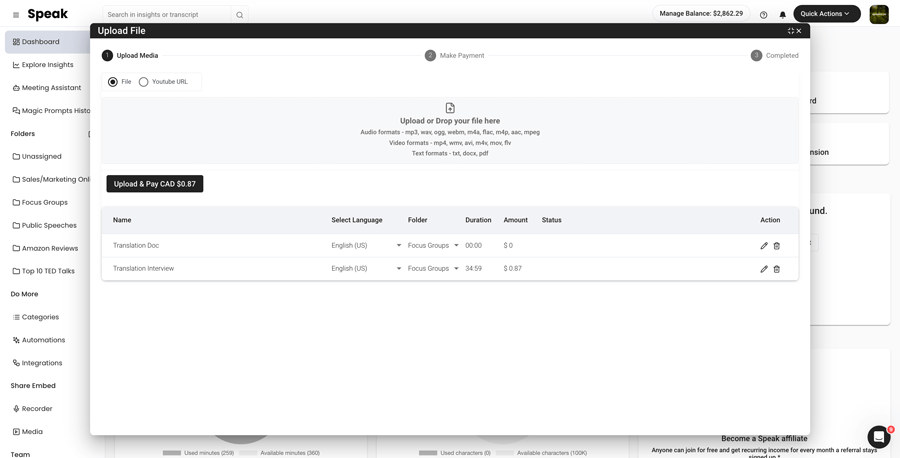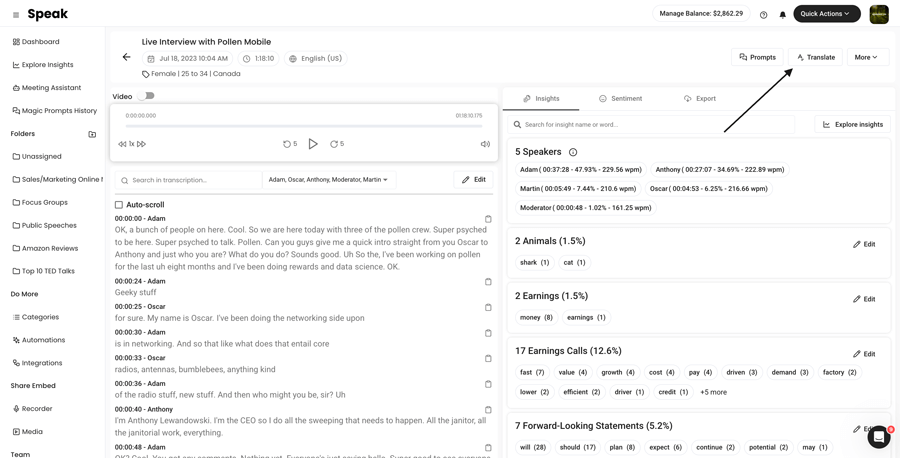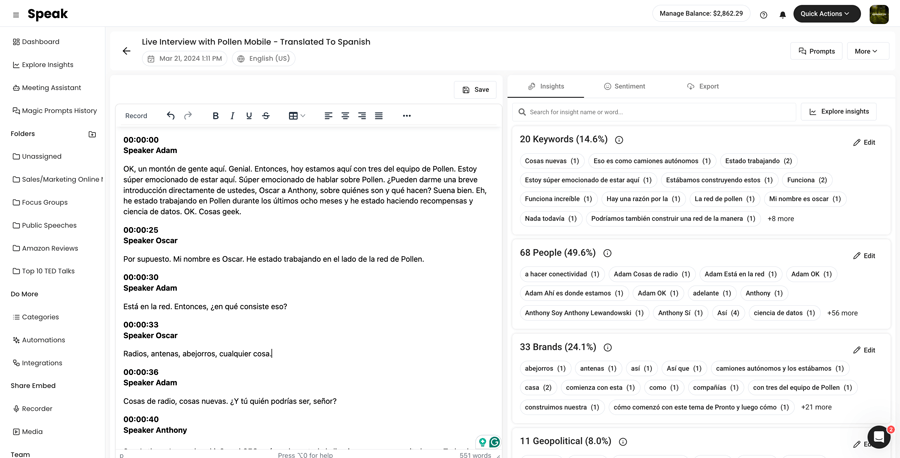How To Translate Pashto to Arabic (Qatar)
Translating Pashto to Arabic (Qatar) is super simple!

Step 1: Register for Speak
Register for Speak using this link.
Once you register, you can instantly begin translating your Pashto to Arabic (Qatar) file(s).

Step 2: Upload Your Pashto file(s)
As soon as you log in, you will be redirected to the dashboard.
Once there, you can select the Quick Action "New Upload".
In Speak, you can seamlessly upload, transcribe and translate audio, video and text files all at once!

Step 3: Translate Your Pashto file(s) to Arabic (Qatar)
Once the file is uploaded, simply visit your file and select "Translate".
If it is an audio and video file, Speak will ask you if you want to keep the speaker names and timestamps in the translation.
Want to translate many files at once? No problem!
You can view the files you want to automatically translate from Pashto to Arabic (Qatar) from the folder level and instantly translate as many files as you need with our artificial intelligence translation in just a few clicks.

Step 4: That's It! View, Analyze, Modify & Export Your New Arabic (Qatar) file(s)
Once the translation is done, you will be alerted and you will see a new document in the same folder your original file is in.
The file will be named the same but with a dash indicating that it is the translated version.
Need support with your Pashto translation?
We are always here and happy to help at Speak!
Just send us a message on live chat on the bottom right corner and we will ensure you are set up for success.
Interested in translating Pashto or other languages to different languages? View our entire list of supported translation languages here.
Automatic, accurate, instant AI translation from Pashto to Arabic (Qatar) is here for you.
Register for Speak using this link and begin translating Pashto to Arabic (Qatar) today.
Unlock the Potential of Pashto to Arabic (Qatar) Translation
In an era where communication barriers are continuously being diminished by technology, the significance of effective and accurate translation between languages such as Pashto and Arabic (Qatar) can't be understated. The demand for seamless translation services has seen a remarkable upsurge, especially among businesses and researchers aiming to establish a foothold in regions where these languages are predominant. Speak AI, leveraging advanced NLP, large language models, and AI-driven technologies, is at the forefront of providing unparalleled Pashto to Arabic (Qatar) translation services.
The Intersection of Technology and Language: A New Dawn for Translation
The Revolutionary Impact of AI on Pashto to Arabic (Qatar) Translation
Traditionally, translation between Pashto and Arabic (Qatar) was fraught with challenges, including discrepancies in dialects, cultural nuances, and complexities inherent in each language. Today, Speak AI is revolutionizing this landscape through its cutting-edge automatic translation technologies that not only ensure accuracy but also maintain the contextual integrity of the content.
Benefits of Automatic Translation for Businesses and Researchers
- Time and Cost Efficiency: Automatic translation dramatically reduces the time and resources spent on traditional translation processes, enabling businesses and researchers to allocate their efforts toward core operational activities.
- Scalability: Speak AI’s translation services allow for scalability, accommodating the growing needs of businesses expanding into new markets without compromising on the quality of translation.
- Accuracy and Reliability: With continuous improvements in AI and machine learning algorithms, the accuracy of translations between Pashto and Arabic (Qatar) has reached unprecedented levels, ensuring reliable communication.
Use Cases: Bridging Communication Gaps
From enabling researchers to disseminate their findings across linguistic borders to assisting businesses in tailoring their content for target markets, the applications of Pashto to Arabic (Qatar) translation are extensive and varied. Moreover, with Speak AI's AI Meeting Assistant, professionals can now transcribe and translate discussions in real-time, unlocking new dimensions of accessibility and understanding.
Exploring the Landscape: Pashto and Arabic (Qatar) in Context
Understanding the Popularity and Relevance in Today's World
Pashto and Arabic (Qatar), each with its unique historical richness and cultural significance, continue to be languages of great importance globally. Pashto, predominantly spoken in Afghanistan and Pakistan, serves as a lingua franca among Pashtun communities. Arabic (Qatar), a dialect of the Arabic language, holds sway in Qatar, a nation known for its strategic economic and political position in the Middle East.
Interesting Stats and Insights
With over 50 million Pashto speakers across the globe and a significant Arabic-speaking population in Qatar, the interaction between these two languages plays a pivotal role in various domains including commerce, academia, and diplomacy. The nuances of these interactions are powered by the rich history and cultural heritage inherent in both languages.
A Closer Look: Pashto and Arabic (Qatar) Unveiled
The Enigmatic Beauty of Pashto and Arabic (Qatar)
Pashto is celebrated for its poetic tradition, with a vast collection of traditional poetry and prose that dates back centuries. Arabic (Qatar), on the other hand, is distinguished by its eloquence and rich literary heritage, making it a fascinating subject for linguistic and cultural studies.
Deciphering the Differences
While both Pashto and Arabic (Qatar) use the Arabic script in their written forms, there are fundamental differences in their phonology, grammar, and syntax. Pashto incorporates a range of unique sounds and has a complex grammatical structure, which is distinct from the relatively simpler grammatical framework of Arabic (Qatar).
Celebrating Similarities
Despite these differences, there are also notable similarities, such as the emphasis on hospitality and respect in both cultures, which are often reflected in the languages' etiquettes and expressions.
Conclusion: Embracing the Future with Speak AI
As the world becomes increasingly interconnected, the value of proficient translation services like those offered by Speak AI cannot be overstated. Bridging the linguistic divide between Pashto and Arabic (Qatar) represents not just a technical achievement, but a step towards fostering better understanding, cooperation, and growth across diverse communities. With Speak AI, businesses and researchers are equipped with a formidable tool to navigate the complexities of language, ensuring that every word translates into success.
FAQs on Pashto to Arabic (Qatar) Translation
What locations are Pashto and Arabic (Qatar) popular?
Pashto is predominantly spoken in Afghanistan and Pakistan, with a diaspora spread across the globe. Arabic (Qatar) is primarily spoken in Qatar, with speakers also in neighboring Arab countries.
Give interesting stats on countries, populations, and history.
Afghanistan, with a population of approximately 38 million, has Pashto as one of its two official languages. In contrast, Qatar, though smaller, is a pivotal nation with Arabic as the official language, exerting significant cultural and economic influence in the Gulf region and beyond.
What are some fun facts about Pashto and Arabic (Qatar)?
A unique aspect of Pashto is its use of "nūra" or nasal sounds, which are rare in other languages. Arabic (Qatar), interestingly, features a distinct pronunciation and lexicon, making it uniquely identifiable among Arabic dialects.
What are the differences and similarities between Pashto and Arabic (Qatar)?
The main differences lie in their phonetic, grammatical structures, and vocabulary. However, both languages share cultural values like hospitality and respect, influenced by their rich historical backgrounds.
Translate Pashto To These Other Supported Languages:
- Translate Pashto-to-Afrikaans
- Translate Pashto-to-Albanian
- Translate Pashto-to-Amharic
- Translate Pashto-to-Arabic (Egypt)
- Translate Pashto-to-Arabic (Iraq)
- Translate Pashto-to-Arabic (Israel)
- Translate Pashto-to-Arabic (Jordan)
- Translate Pashto-to-Arabic (Kuwait)
- Translate Pashto-to-Arabic (Lebanon)
- Translate Pashto-to-Arabic (Oman)
- Translate Pashto-to-Arabic (Palestinian Authority)
- Translate Pashto-to-Arabic (Qatar)
- Translate Pashto-to-Arabic (Saudi Arabia)
- Translate Pashto-to-Arabic (Syrian Arab Republic)
- Translate Pashto-to-Arabic (United Arab Emirates)
- Translate Pashto-to-Arabic Modern Standard (Bahrain)
- Translate Pashto-to-Armenian
- Translate Pashto-to-Assamese
- Translate Pashto-to-Aymara
- Translate Pashto-to-Azerbaijani
- Translate Pashto-to-Bambara
- Translate Pashto-to-Basque
- Translate Pashto-to-Belarusian
- Translate Pashto-to-Bengali
- Translate Pashto-to-Bhojpuri
- Translate Pashto-to-Bosnian
- Translate Pashto-to-Bulgarian
- Translate Pashto-to-Catalan
- Translate Pashto-to-Cebuano
- Translate Pashto-to-Chinese (Simplified)
- Translate Pashto-to-Chinese (Traditional)
- Translate Pashto-to-Corsican
- Translate Pashto-to-Croatian
- Translate Pashto-to-Czech
- Translate Pashto-to-Danish
- Translate Pashto-to-Dari
- Translate Pashto-to-Dhivehi
- Translate Pashto-to-Dogri
- Translate Pashto-to-Dutch
- Translate Pashto-to-English
- Translate Pashto-to-English (Australia)
- Translate Pashto-to-English (Indian)
- Translate Pashto-to-English (Irish)
- Translate Pashto-to-English (New Zealand)
- Translate Pashto-to-English (Scottish)
- Translate Pashto-to-English (South African)
- Translate Pashto-to-English (United Kingdom)
- Translate Pashto-to-English (United States)
- Translate Pashto-to-Esperanto
- Translate Pashto-to-Estonian
- Translate Pashto-to-Ewe
- Translate Pashto-to-Farsi (Persian)
- Translate Pashto-to-Filipino Tagalog
- Translate Pashto-to-Finnish
- Translate Pashto-to-French
- Translate Pashto-to-French (Canada)
- Translate Pashto-to-Frisian
- Translate Pashto-to-Galician
- Translate Pashto-to-Georgian
- Translate Pashto-to-German
- Translate Pashto-to-German (Swiss)
- Translate Pashto-to-Greek
- Translate Pashto-to-Guarani
- Translate Pashto-to-Gujarati
- Translate Pashto-to-Haitian Creole
- Translate Pashto-to-Hausa
- Translate Pashto-to-Hawaiian
- Translate Pashto-to-Hebrew
- Translate Pashto-to-Hindi
- Translate Pashto-to-Hmong
- Translate Pashto-to-Hungarian
- Translate Pashto-to-Icelandic
- Translate Pashto-to-Igbo
- Translate Pashto-to-Ilocano
- Translate Pashto-to-Indonesian
- Translate Pashto-to-Irish
- Translate Pashto-to-Italian
- Translate Pashto-to-Japanese
- Translate Pashto-to-Javanese
- Translate Pashto-to-Kannada
- Translate Pashto-to-Kazakh
- Translate Pashto-to-Khmer
- Translate Pashto-to-Kinyarwanda
- Translate Pashto-to-Konkani
- Translate Pashto-to-Korean
- Translate Pashto-to-Krio
- Translate Pashto-to-Kurdish
- Translate Pashto-to-Kurdish (Sorani)
- Translate Pashto-to-Kyrgyz
- Translate Pashto-to-Lao
- Translate Pashto-to-Latin
- Translate Pashto-to-Latvian
- Translate Pashto-to-Lingala
- Translate Pashto-to-Lithuanian
- Translate Pashto-to-Luganda
- Translate Pashto-to-Luxembourgish
- Translate Pashto-to-Macedonian
- Translate Pashto-to-Maithili
- Translate Pashto-to-Malagasy
- Translate Pashto-to-Malay
- Translate Pashto-to-Malayalam
- Translate Pashto-to-Maltese
- Translate Pashto-to-Maori
- Translate Pashto-to-Marathi
- Translate Pashto-to-Meiteilon (Manipuri)
- Translate Pashto-to-Mizo
- Translate Pashto-to-Mongolian
- Translate Pashto-to-Myanmar (Burmese)
- Translate Pashto-to-Nepali
- Translate Pashto-to-Norwegian
- Translate Pashto-to-Nyanja (Chichewa)
- Translate Pashto-to-Odia (Oriya)
- Translate Pashto-to-Oromo
- Translate Pashto-to-Pashto
- Translate Pashto-to-Persian
- Translate Pashto-to-Polish
- Translate Pashto-to-Portuguese
- Translate Pashto-to-Portuguese (Brazilian)
- Translate Pashto-to-Portuguese (Portugal)
- Translate Pashto-to-Punjabi
- Translate Pashto-to-Quechua
- Translate Pashto-to-Romanian
- Translate Pashto-to-Russian
- Translate Pashto-to-Samoan
- Translate Pashto-to-Sanskrit
- Translate Pashto-to-Scots Gaelic
- Translate Pashto-to-Sepedi
- Translate Pashto-to-Serbian
- Translate Pashto-to-Sesotho
- Translate Pashto-to-Shona
- Translate Pashto-to-Sindhi
- Translate Pashto-to-Sinhala
- Translate Pashto-to-Sinhala (Sinhalese)
- Translate Pashto-to-Slovak
- Translate Pashto-to-Slovenian
- Translate Pashto-to-Somali
- Translate Pashto-to-Spanish
- Translate Pashto-to-Spanish (Mexico)
- Translate Pashto-to-Sundanese
- Translate Pashto-to-Swahili
- Translate Pashto-to-Swedish
- Translate Pashto-to-Tajik
- Translate Pashto-to-Tamil
- Translate Pashto-to-Tatar
- Translate Pashto-to-Telugu
- Translate Pashto-to-Thai
- Translate Pashto-to-Tigrinya
- Translate Pashto-to-Tsonga
- Translate Pashto-to-Turkish
- Translate Pashto-to-Turkmen
- Translate Pashto-to-Twi (Akan)
- Translate Pashto-to-Ukrainian
- Translate Pashto-to-Urdu
- Translate Pashto-to-Uyghur
- Translate Pashto-to-Uzbek
- Translate Pashto-to-Vietnamese
- Translate Pashto-to-Welsh
- Translate Pashto-to-Xhosa
- Translate Pashto-to-Yiddish
- Translate Pashto-to-Yoruba
- Translate Pashto-to-Zulu



